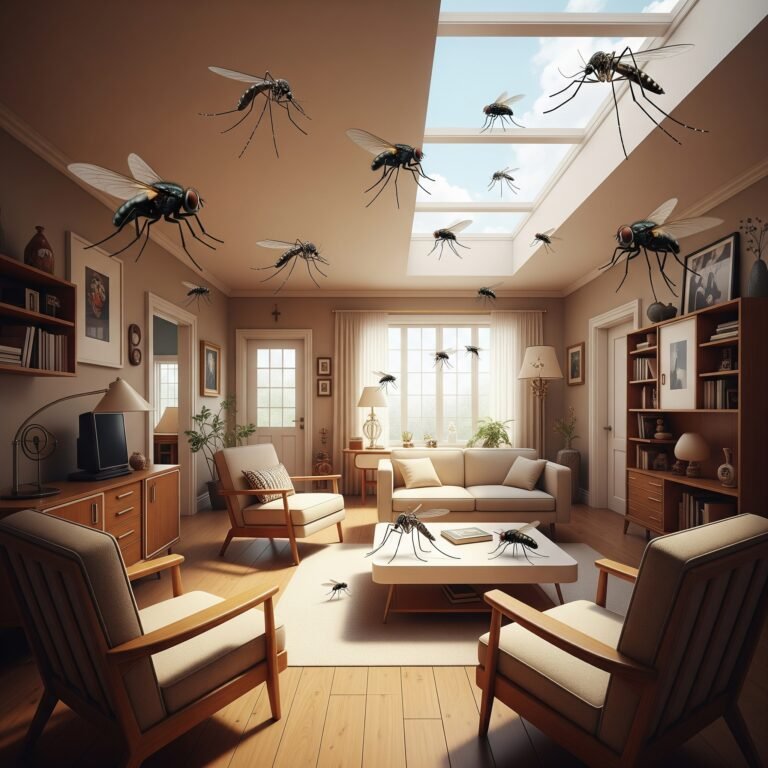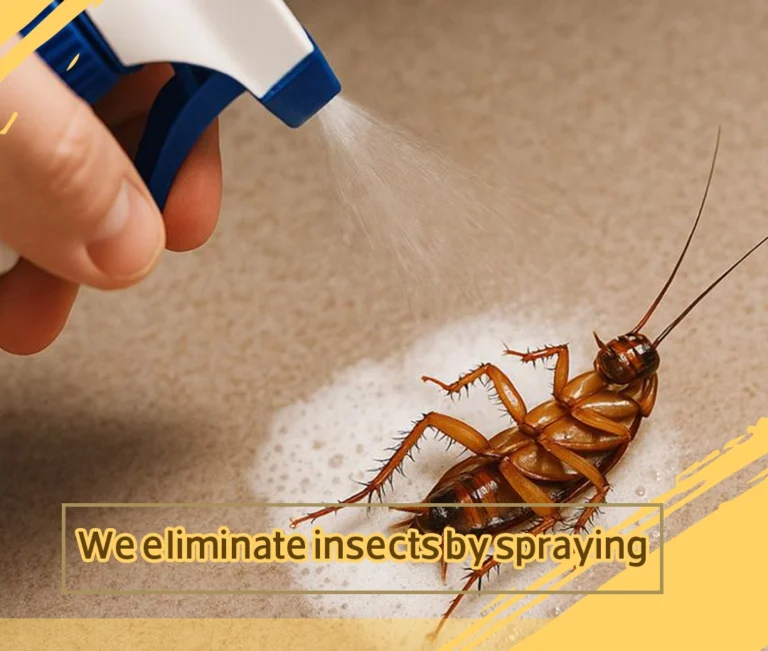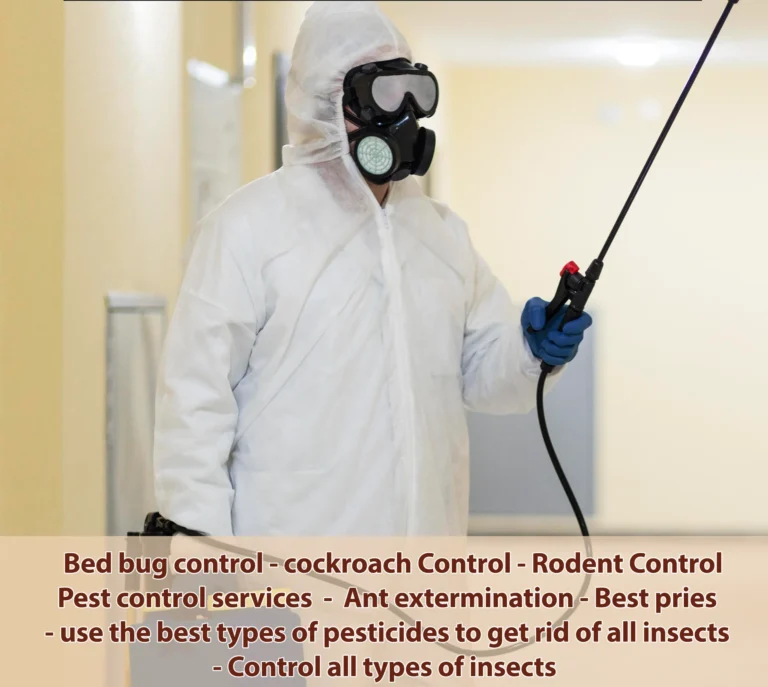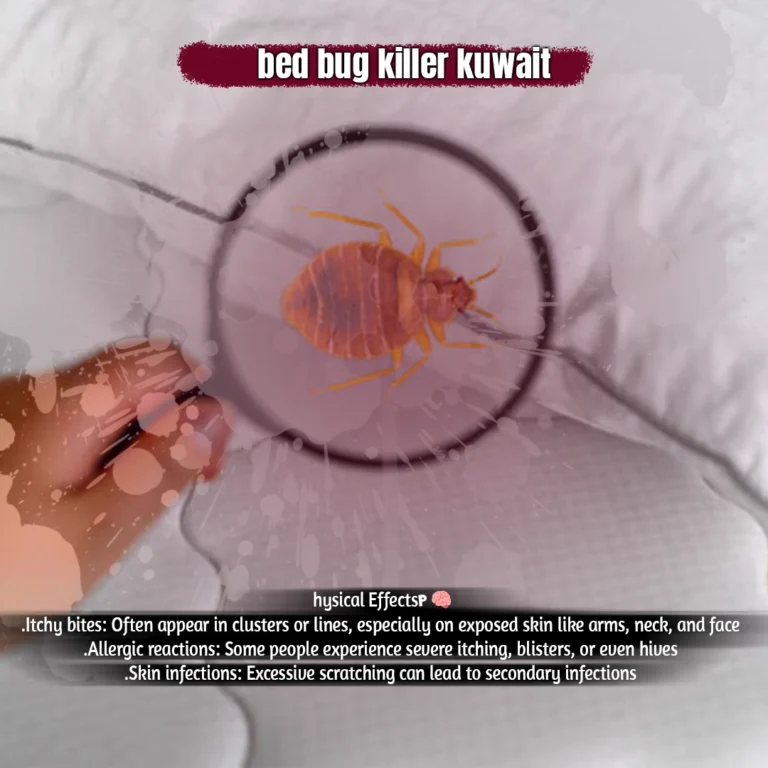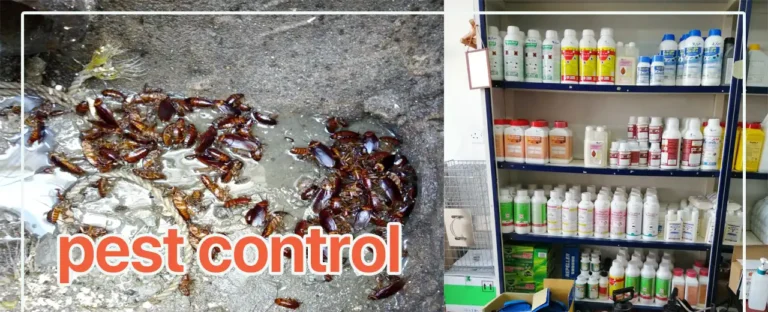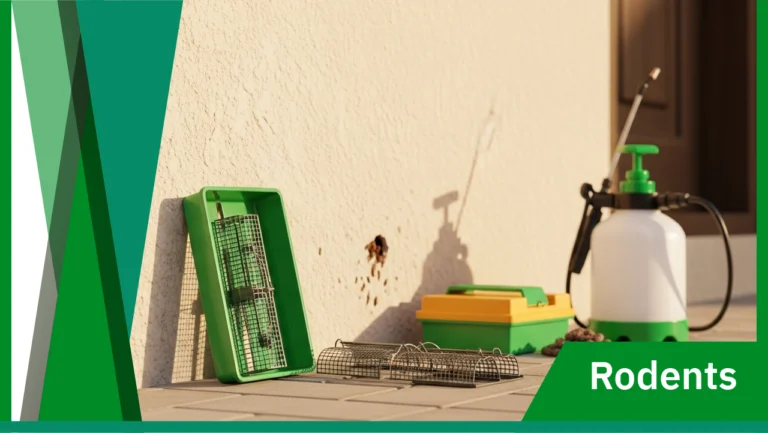pest control jahra We offer you the. best services to remove panic from the home, family, elderly and children. We have a one-year warranty Contact us on Contact us now 98949693 Special offers.
Common insect-borne diseases in Kuwait:
Mosquitoes: Dengue fever, malaria (if present).
Flies: Gastrointestinal diseases (diarrhea, cholera).
Cockroaches: Allergies, asthma, bacterial transmission.
Rats: Plague (historically), leptospirosis, salmonella.
Bedbugs: Skin irritation, insomnia, allergies.
The Role of Pest Control in Public Health: How Pest Control Companies Contribute to Community Protection.
The Role of Individuals: Health and Preventive Tips Citizens Can Follow to Reduce Exposure to Pests.
Introduction to Insect-Related Public Health Issues in Kuwait
Insects play a significant role in public health challenges across the globe, and Kuwait. is no exception. The presence of certain insect species can lead to adverse effects on. human health, making it essential to understand the connection between these pests and public well-being. Among the various insects posing threats in Kuwait, cockroaches, ants, bedbugs, and mice are particularly. noteworthy due to their potential to transmit diseases and disrupt daily life. Cockroaches, for example, are known carriers of pathogens that can cause gastrointestinal diseases, while ants can contribute to food contamination in both residential and commercial settings.
Bedbugs have increasingly become a concern in urban areas, causing. not only physical discomfort through their bites but also psychological distress for those infested. The resilience of bedbug populations makes them difficult to eliminate, further complicating public health efforts. Additionally, mice, though not insects, fall into a similar category of pests that warrant attention because of their capacity to transmit illnesses such as hantavirus and leptospirosis. , alongside their role in worsening asthma and allergies.
Monitoring and addressing these insect populations are crucial for several reasons. First, an increase in insect populations can serve as an indicator of underlying public. health issues, such as inadequate waste management and sanitation practices. Effective pest control strategies can significantly mitigate these issues, thus reducing disease transmission risk. Furthermore, public awareness campaigns highlighting the need for proactive measures can empower residents to participate in pest prevention initiatives. Ultimately, understanding the significance of insects and their interactions with public health will facilitate the development. of comprehensive strategies focusing on prevention and. elimination to safeguard the community’s health in Kuwait.
Common Insects and Pests in Kuwait
Kuwait, with its diverse ecosystems, is home to various insects and pests that pose significant risks to public health. Among the most prevalent species are the cockroach, mosquito, and housefly. Each of these insects exhibits distinct characteristics,. habitats, and behaviors that underscore their role in the spread of diseases and other health concerns.
The cockroach is one of the most common household pests in Kuwait. These insects are typically nocturnal and thrive in areas with moisture and food availability, making kitchens and bathrooms prime habitats. They are known carriers of bacteria, which can contaminate food and surfaces, leading to illnesses such as gastroenteritis. Given their reproductive capabilities, a small infestation can quickly escalate, heightening the public health risk.
Mosquitoes are another significant pest in Kuwait, especially during the warmer months. Species such as the Culex and Aedes mosquitoes can breed in stagnant water, often found in containers, discarded tires, and even in plant pots. These insects are notorious for transmitting diseases like dengue fever and West Nile virus, posing a substantial threat to public health. The interaction between mosquitoes and humans typically occurs in areas with inadequate sanitation and stagnant water, exacerbating the health risks associated with these pests.
Additionally, the housefly is prevalent in urban areas, attracted to organic waste and garbage. Houseflies can carry over 100 pathogens, including bacteria that lead to food poisoning. Their ability to rapidly reproduce allows them to thrive in various environments, making them a critical concern in maintaining public hygiene and health.
Understanding these common insects and pests is essential for developing effective prevention and elimination strategies. Recognizing their characteristics, behaviors, and interactions with human environments will play a crucial role in mitigating health risks in Kuwait.
Health Risks Associated with Insects in Kuwait
The diverse insect population in Kuwait poses Pest Control significant health risks that cannot be overlooked. First and foremost, insects such as mosquitoes are known vectors for various diseases, including dengue fever, West Nile virus, and other mosquito-borne illnesses. The hot and humid climate in Kuwait creates a conducive environment for mosquito breeding, thus increasing the likelihood of outbreaks. Similarly, cockroaches can transmit pathogens, potentially leading to gastroenteritis and food poisoning. Their droppings and secretions can contaminate food and surfaces, exacerbating health risks among vulnerable populations.
Another critical concern is the presence of biting insects like fleas and ticks. These pests can lead to uncomfortable conditions such as skin irritations and allergic reactions. In some cases, they may also transmit Lyme disease and other tick-borne illnesses. Allergies can be aggravated by insect bites or by inhalation of insect fragments or droppings, particularly in sensitive individuals, leading to chronic respiratory conditions.
The psychological effects of insect infestations should not be underestimated either. The presence of pests can induce stress, anxiety, and a sense of helplessness among residents. For example, persistent infestations of bed bugs often result in sleep disturbances and depression due to the fear of bites while sleeping, which can severely impact quality of life.
Additionally, the social stigma associated with infestations can further complicate matters, leading to isolation and withdrawal from social interactions. It is crucial to recognize and address these health risks related to insect populations in Kuwait. Immediate action and effective pest control strategies are essential to mitigate these dangers and safeguard public health.
Environmental Factors Contributing to Insect Infestations
The environment plays a pivotal role in shaping the prevalence of insect infestations, particularly in regions like Kuwait. Several key factors, including climate, urbanization, and waste management practices, collectively create conducive conditions for insects, making it imperative to understand these elements to develop effective prevention strategies.
Kuwait’s climate is characterized by extreme heat and limited rainfall, which influences insect behavior and reproduction. The soaring temperatures create an environment that allows certain species, such as mosquitoes and flies, to thrive. Furthermore, arid conditions can lead to stagnant water in various forms, from poorly maintained swimming pools to garden ponds, which become breeding grounds for mosquitoes. The warm climate extends the breeding season, allowing insects to multiply rapidly, thereby posing significant health risks.
pest control jahra
Urbanization in Kuwait has led to increased construction and land development, which disrupts natural habitats and forces insects to adapt to urban settings. The expansion of cities often results in the creation of microenvironments that are favorable for pests, such as cracks and crevices in buildings that provide shelter. Moreover, the urban heat island effect, where urban areas become significantly warmer than their rural counterparts, further exacerbates the situation by supporting insect survival and reproduction.
Effective waste management practices are critical in mitigating insect infestations. Unfortunately, improper disposal of waste can attract a range of insects, from cockroaches to flies. The accumulation of organic waste in poorly managed areas provides food sources and breeding sites for these pests. Consequently, improving waste management infrastructure and promoting community awareness on proper waste disposal are essential steps toward reducing insect populations.
Addressing these environmental factors through comprehensive public health policies and community engagement can help mitigate the impact of insect infestations in Kuwait. By fostering a collaborative approach, it is possible to enhance prevention strategies and safeguard public health against the threats posed by insects.
Immediate Steps to Take for Insect Prevention
Maintaining a pest-free environment is vital for public health, particularly in areas prone to insect infestations. For residents in Kuwait, immediate preventive measures can significantly mitigate the risk of insects invading homes and communities. One of the critical strategies is sanitation, which involves sustaining a clean living space to deter pests. Regular cleaning of both indoor and outdoor areas can help eliminate food sources and breeding grounds for insects.
In addition to sanitation, proper food storage plays an essential role in preventing insect infestations. It is imperative to store food in sealed containers to avoid attracting pests such as ants, cockroaches, and flies. Disposing of food waste in tightly secured bins can further reduce the likelihood of infestations. Furthermore, residents should ensure that spills and crumbs are promptly cleaned to ensure that food remnants do not provide sustenance for insects.
Another essential step is sealing entry points in buildings. Insects can gain access through small cracks and gaps in walls, windows, and doors. Regularly inspecting and repairing these areas can significantly reduce the chances of infestations. Utilizing weather stripping and caulking can effectively close these openings, creating a barrier against common pests.
Routine maintenance is also a critical factor in pest control. Homeowners should conduct regular checks in attics, basements, and other less frequently accessed areas to monitor for early signs of infestations. Implementing practices such as trimming overgrown vegetation and removing standing water can help deter insect breeding sites in outdoor spaces.
Lastly, community engagement in awareness programs is fundamental to boosting prevention efforts. Educating neighbors about the significance of insect prevention measures fosters collective responsibility. Communities can organize clean-up drives or workshops that focus on pest management and promote shared responsibility in keeping environments insect-free.
Effective Methods for Eliminating Insects
The management of insect populations is essential for ensuring public health in Kuwait. A range of methods, encompassing both chemical and non-chemical approaches, can be employed to achieve effective pest control. Recognizing the type of insect, the extent of the infestation, and the environment in which it occurs is crucial for determining the best method of eradication.
Professional pest control services are often the most effective option, particularly for severe infestations. These companies employ trained personnel who utilize specialized equipment and environmentally safe products. Their expertise allows for targeted applications of insecticides that minimize risks to humans, pets, and beneficial organisms. Furthermore, pest control professionals often conduct thorough assessments to identify the source of the infestation, preventing future occurrences.
For those seeking more cost-effective solutions, DIY methods can be equally effective, provided they are executed correctly. Simple strategies such as sealing cracks and crevices, maintaining cleanliness, and minimizing standing water can significantly reduce insect attraction. Natural insect repellents made from essential oils or vinegar can serve as alternatives to chemical products. However, when selecting DIY methods, it is critical to consider the efficacy, safety, and environmental impacts of these alternatives, ensuring they do not unintentionally harm beneficial insect species.
Safety should be of the utmost importance when employing either chemical or non-chemical pest control methods. Individuals should carefully follow product instructions and adhere to safety guidelines to mitigate any potential risks associated with insecticides. In addition, awareness of local regulations regarding pest control products can aid in maintaining compliance with environmental standards.
By understanding and implementing a combination of these methods, Kuwait can effectively address insect-related public health concerns and enhance overall community well-being.
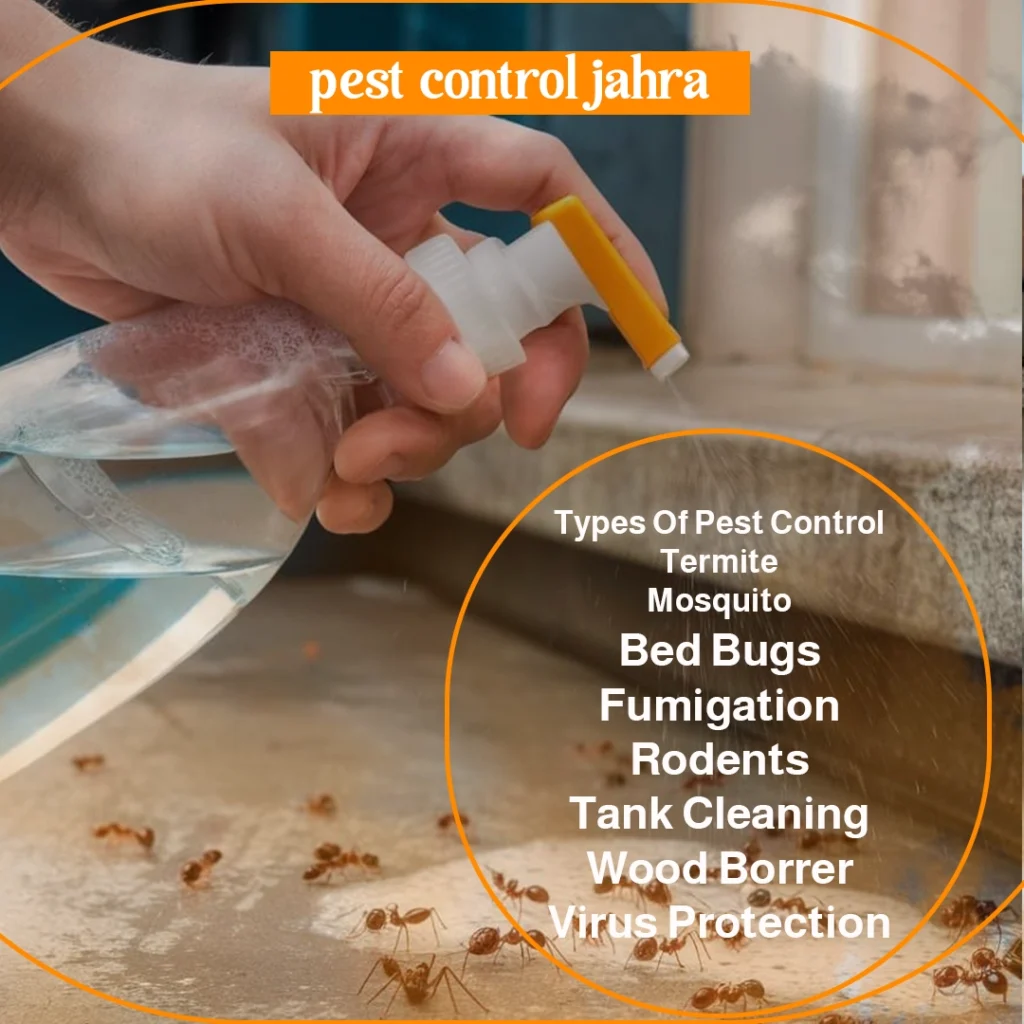
Bedbug Management Strategies
Bedbugs, scientifically known as Cimex lectularius, are small, blood-feeding insects that have garnered considerable attention due to their resurgence in many urban areas, including Kuwait. Effective management strategies are crucial for addressing bedbug infestations, which can lead to significant psychological distress in affected individuals. The first step in managing bedbugs is identification. Signs of an infestation include reddish-brown stains on bedding, shed exoskeletons, and the presence of live insects in hiding spots such as mattress seams and furniture. Awareness of these indicators allows individuals to detect an infestation early and implement appropriate control measures.
Prevention strategies are equally important in the fight against bedbugs. Regular inspection of living spaces and frequent laundering of bedding and clothing at high temperatures can greatly reduce the risk of an infestation. Additionally, sealing cracks and crevices in walls or floors can minimize potential hiding spots for these insects. When traveling, it is advisable to inspect hotel rooms thoroughly and keep luggage elevated off the ground to prevent bringing bedbugs home. Public awareness campaigns could also foster education on the importance of preventative measures, contributing to a community-wide initiation against these pests.
Treatment options for bedbug infestations range from chemical insecticides to non-chemical methods such as steam treatment and vacuums. Chemical applications should be performed judiciously and preferably by licensed pest control professionals, ensuring safety and effectiveness. Furthermore, the psychological toll of bedbug infestations cannot be overlooked; individuals may experience anxiety, insomnia, and social stigmatization. Addressing these psychological concerns through community support and accessing mental health resources is essential in treating the overall impacts of bedbug infestations. A multifaceted approach that combines identification, prevention, treatment, and psychological support is vital for effective bedbug management.
Community Initiatives and Government Policies
The collaboration between community initiatives and government policies plays a crucial role in managing public health risks associated with insects in Kuwait. Various programs have been implemented to address the challenges posed by insect infestations, particularly in urban areas where densely populated environments create optimal conditions for insects to thrive. Public health authorities in Kuwait have recognized the need for effective strategies to mitigate these risks and have rolled out various initiatives aimed at both prevention and elimination of insects, such as mosquitoes and rodents.
One of the notable community initiatives involves the mobilization of local volunteers who participate in awareness campaigns about the risks associated with insect-borne diseases. These campaigns have proven effective in educating the public on preventive measures, such as proper waste disposal and maintaining clean environments, which significantly reduce the breeding grounds for pests. Furthermore, the government provides resources and support to empower these local efforts, thereby strengthening the impact of community-driven actions.
pest control jahra
While existing programs have made strides in addressing public health issues related to insects, there is still room for improvement. Enhancing inter-agency collaboration can help streamline operations and promote an integrated approach to pest control. Additionally, incorporating feedback from community members can lead to more tailored solutions that reflect local needs. For instance, involving residents in pest monitoring initiatives allows for better identification of potential hotspots for infestations.
Public involvement is essential in combating insect infestations effectively. Ensuring that community members are informed and engaged not only raises awareness but also fosters a sense of responsibility towards maintaining a healthier environment. This can be achieved through educational workshops, social media campaigns, and collaboration with schools to instill the importance of insect control from a young age. By empowering the community alongside government efforts, Kuwait can build a robust framework to protect public health against insect-related threats.
Conclusion and Call to Action
The presence of insects in Kuwait poses significant challenges to public health, as they can act as vectors for diseases and create broad health impacts. Throughout this blog post, we have explored various facets of insect-related issues, including the types of pests commonly found in the region such as mosquitoes, cockroaches, and termites. We also examined their potential health implications, emphasizing the importance of pest control strategies to prevent disease transmission. The discussion highlighted the necessity of employing integrated pest management that combines biological, chemical, and environmental approaches to combat insect infestations effectively.
Public awareness and education play crucial roles in this context. It is essential for residents and stakeholders to understand the importance of maintaining property hygiene and landscape management to deter insect populations. Simple measures such as proper waste disposal, sealing entry points, and maintaining clean surroundings can greatly reduce infestations. Additionally, recognizing the signs of pest activity promptly can lead to swift action and mitigation, thereby reducing health risks.
We encourage readers to adopt proactive measures in their homes and communities, understanding that the responsibilities do not solely lie with local authorities or pest control services. It requires a collective effort to create a healthy living environment free from insect-borne diseases. If you encounter persistent infestations or are unsure about effective treatment methods, seeking assistance from professional pest control services is advisable. Together, with an informed public and responsive pest management strategies, we can significantly mitigate the health hazards posed by insects in Kuwait. Your vigilance and actions can make a substantial difference in protecting public health.
Understanding the Seasonal Pest Landscape in Kuwait
The seasonal pest landscape in Kuwait is significantly influenced by the country’s unique climatic conditions. The extreme temperatures and varying humidity levels create an environment conducive to different pests depending on the season. During the summer months, characterized by elevated temperatures and increased humidity, certain pests thrive and become more prevalent. These include mosquitoes, cockroaches, and various species of rodents, which are well-suited to endure and exploit the summer climate.
Mosquitoes, for instance, become highly active during the warmer months. Standing water from irrigation and fluctuating humidity creates ideal breeding sites for these insects. Their presence not only poses health risks through the potential transmission of diseases but also disrupts outdoor activities for residents and visitors alike. Similarly, cockroaches find the warm, humid conditions to be favorable for hiding and breeding. They are notorious for invading homes and commercial establishments in search of food and shelter, making their control a priority for residents during the summer.
Transitioning into winter, the pest landscape changes considerably. Lower temperatures drive certain pests to seek refuge indoors, leading to increased sightings of bed bugs and ants in homes and businesses. Bed bugs, which can proliferate under various conditions, often hitch rides on clothing or luggage, making them difficult to eliminate once established. Ants, on the other hand, may forage indoors seeking warmth and food, especially during colder months. Recognizing these seasonal patterns in pest activity is vital for effective prevention and control measures. By understanding the behavior and life cycles of these pests, residents can better prepare for seasonal infestations and mitigate their impact on everyday life.
Importance of Seasonal Pest Control Services
Seasonal pest control services play a crucial role in safeguarding residences and commercial establishments from potential infestations. Throughout the year, various pests can invade homes and businesses, leading to a host of complications that can jeopardize health and safety. The proactive management of pests is essential due to the significant health risks associated with infestations, such as allergies, respiratory issues, and the transmission of diseases. Common pests, including rodents and insects, can spread pathogens that expose occupants to serious health threats.
Moreover, infestations can cause considerable property damage. Termites, for instance, can compromise structural integrity by feeding on wood and other building materials. Ants and cockroaches can contaminate food supplies, resulting in not only physical harm to property but also financial loss. If left untreated, pest problems can escalate, necessitating costly repairs and remediation efforts that far exceed the initial investment in seasonal pest control.
Ignoring the signs of pest activity may also lead to increased pest populations, making eradication efforts more challenging and labor-intensive over time. Professional pest control services offer expertise in identifying and mitigating these issues before they become severe. By utilizing seasonal pest control services, property owners can create a safe and healthy living environment, significantly reducing the likelihood of infestations during peak pest seasons. Furthermore, engaging with qualified pest control providers ensures that effective strategies are employed, utilizing integrated pest management techniques tailored to the unique challenges posed by the diverse climate conditions in Kuwait.
Ultimately, proactive seasonal pest control is not merely a precaution; it is a necessary investment that protects health, preserves property, and saves money in the long run. By prioritizing pest management, homeowners and businesses can foster a safe and comfortable atmosphere for all inhabitants.
Preparing Your Home for Pest Control in Different Seasons
To effectively prepare your home for pest control treatments, it is essential to consider the unique challenges presented by seasonal pests during both summer and winter. Ensuring a pest-resistant environment can significantly enhance the efficacy of pest control services. Start by decluttering your living spaces. A cluttered home provides ample hiding spots for various pests, making it crucial to organize belongings and remove excess items. Focus on areas such as attics, basements, and garages, where unwanted pests often thrive.
Another essential step is to seal any potential entry points in your home. Inspect windows, doors, and foundation cracks for gaps that could allow pests to enter. Use caulk or weather stripping to close these openings, thereby reducing the chances of pest infestations. Ensuring proper ventilation is also vital, particularly during the summer months when humidity and heat encourage pest activity. Adequate airflow can help maintain a dry environment, deterring pests such as ants and cockroaches.
Maintaining cleanliness is key when preparing your home for pest control. Regular cleaning routines should include vacuuming, sweeping, and mopping all floors to remove food particles and debris that attract pests. Pay particular attention to the kitchen, where food waste can quickly lead to infestations. Moreover, you should not overlook outdoor spaces. Trim any overgrown vegetation, and keep your yard tidy to discourage pests from nesting close to the house. Store firewood and outdoor furniture properly to minimize pest habitats.
By following these practical tips, homeowners can create a more pest-resistant environment and prepare effectively for seasonal pest control treatments. Such preventive measures complement pest control efforts and enhance the effectiveness of treatments, leading to a more comfortable home throughout the year.
Choosing the Right Pest Control Service for Seasonal Needs
When selecting a pest control service for seasonal needs, several key factors should guide your decision to ensure effective pest management. Firstly, pest control services near salwa
consider the company’s experience in the field. A seasoned pest control provider is more likely to have the necessary expertise and knowledge to tackle various pest issues that arise during specific seasons in Kuwait. Look for services that have operated in the region for several years, as they will be more familiar with the unique challenges posed by local pests.
Next, evaluate the range of services offered by the pest control company. Seasonal pest control requires tailored approaches to address different pests at various times of the year. For instance, a company that provides not only treatment but also prevention strategies will be more beneficial in managing seasonal infestations effectively. Ensure that the provider is well-versed in integrated pest management practices, which combine multiple techniques to keep pests at bay.
Customer reviews and testimonials are invaluable resources when choosing a pest control service. They provide insight into the experiences of past clients and help gauge the company’s reliability. Reviews can highlight the effectiveness of treatments as well as the level of customer service received. Furthermore, inquire about the company’s eco-friendly practices. As concern for the environment grows, opting for a service that uses environmentally conscious methods can align with personal values while effectively managing pests.
Additionally, do not hesitate to ask potential providers questions regarding their methods, response times, and follow-up services to evaluate their compatibility with your needs. Working with local experts who understand the specific pest challenges in Kuwait can enhance the efficacy of pest control efforts. These experts can offer tailored advice based on local conditions, ensuring your seasonal pest management is both effective and sustainable.
Summer Pest Control:
Common insects in the summer: mosquitoes, flies, cockroaches, ants.
Why do they increase in the summer? (Heat and humidity).
Preventive and treatment services required.
Winter Pest Control:
Common insects in the winter: mice, bed bugs (hide indoors for warmth).
Preventive and treatment services required.
The importance of regular and preventative pest control: instead of waiting until the problem spreads.
Tips for every season: What people should do in each season to maintain their homes.
pest control company in Al Jahra
pest control company in Al Jahra for insecticides: . If you’re looking for a quick and effective solution to get rid […]
Pest control company Kuwait
Pest control company Kuwait for insecticides: . If you’re looking for a quick and effective solution to get rid of […]
Rodent control in Kuwait
Rodent control in Kuwait Introduction to Rodent Control in Kuwait Rodents are among the most troublesome insects and animals that cause. […]
bed bug killer
bed bug killer are one of the most persistent and frustrating household pests, capable of spreading quickly and causing sleepless […]
cockroach killer
Cockroach killer are among the most annoying and dangerous insects to health, due to their ability to transmit diseases and reproduce […]
rodents
rodents 🐀 Introduction to Rodent Control in Kuwait Rodents are among the most troublesome insects and animals that cause. significant […]
